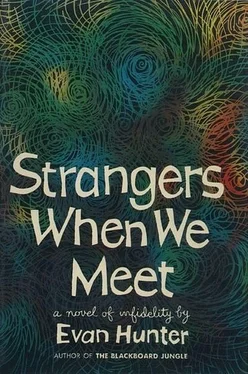“Hello?”
“Altar?”
“Yes?”
“This is Larry Cole.”
“Man, it’s the middle of the night. What—?”
“I just finished your book.”
“Oh.”
There was a long silence.
“I want to design your house.”
Altar laughed a curiously relieved laugh.
“Thanks,” he said.
She did not like autumn, would never like it.
Autumn was a time of dying, the death of her grandfather in November the biggest dying of all, but other dyings too, little dyings, death falling from the trees, rattling underfoot. The splendid deceptive coloration of death, a spreading fungus which lapped the bright green of summer with decaying reds and oranges and yellows. The sun, too, died in autumn. Bright and golden, it turned pale and sickly yellow, pasted against a lusterless sky, intimidated by the sharp bite of a new wind. October was a paradox, a frigid month which dressed itself in the hot-blooded colors of a streetwalker — but only to attend a funeral.
I’m too morbid, she thought. I must stop being morbid. It’s because winter is coming. Still, I must stop.
It was all a matter of routine, she supposed. The new routine of getting Patrick off to school every day, and then moving around in a house gone suddenly still. The Cape Cod seemed larger with him gone. In its silent immensity, there no longer seemed a need for the third bedroom they’d put upstairs. But Don had insisted on a guest room for his mother’s visits, and so of course the shift had taken place: master bedroom into the finished attic, Patrick into the old master bedroom, and the smallest bedroom saved for Mrs. Gault, always clean and waiting for her descent.
I might as well get started, she thought, and doggedly she went upstairs to the bedroom in the finished attic of the Pinecrest Manor house.
Don’s tee shirt and shorts lay on the floor in the center of the room, rumpled and white against the multicolored scatter rug. The canopied bed stood against the far wall of the room, the blankets trailing onto the floor; Distastefully, she picked up the underwear and took them to the hamper. There was something that annoyed her about his clothes. Not just his dirty clothes, but all of his clothes, even the clean white shirts lined up with precision in the cherrywood dresser, fresh from the laundry, the curlicued DG monogram over each breast pocket. Or his newly pressed suits and jackets in the closet, wide shoulders stretched taut over the hangers, trousers neatly folded over the wooden supporting bars. Unworn clothes were false and pathetic, but the fact was that she disliked Don’s clothes even when he was inside them.
With intuitive female logic, she understood there was something wrong with her attitude. She had seen other women wearing their husbands’ shirts or jackets with a curious sense of proprietorship. She had known from their expressions that they gained more from the experience than the simple female advantage of looking fragile and protected in the overlarge male garments.
But she could remember the boat ride, the dark inland waters of the Hudson, the timid assault of new stars on a deepening dusky sky, the chill wind blowing off the water, a cutting wind that penetrated to her bones. Sitting with the women, listening to talk of babies and toilet training, she had felt the wind. Don, the man among men, the only husband who had not drunk too much that afternoon at Bear Mountain, had left the male company of dirty-joke tellers and come to her, offering his sweater.
With the sweater around her, with the coarse wool against her flesh, she had begun trembling. Even the wind had not caused her to tremble so. There was the smell of her husband on the sweater, his hair tonic, his after-shave, his body. In the tight circle of bellowing male voices and simpering female echoes, she had felt suddenly nauseated. Quickly she had taken off the sweater and handed it back to him. And then she’d made her way aft, turning her face to the cold breeze that swept off the swirling waters of the Hudson.
She had hurt him badly that night. They had made the long drive home from the pier in silence, but his eyes told her all there was to say. Blue, flecked with white, they seemed to echo the stiff regularity about Don which first impressed you. It was not until later that you felt any warmth from him; it was not until later that you realized the blue eyes were gentle and easily penetrated by daggers of pain.
In the darkness of their attic bedroom, in the rectangular canopied vastness of their bed, with the modern air conditioner anachronistically humming beneath the ruffled curtain in the Cape Cod house, with the summer sounds of hushed automobile tires far away bruising the insect drone of the night, his hand had touched her shoulder tentatively. She had not turned. His hand had rested on her flesh lightly, unmoving. There were words in his hand, so many words, but lying stiffly naked beside him, she chose not to understand the gentle pressure, so that he was forced finally to speak.
“Should we make love?”
“No,” she said.
“Oh.”
A single word, and she was glad she could not see the blue eyes in that moment. He drew back his hand, and again the room was silent, and at last he sighed and said, “Good night, Margaret.”
He never mentioned the sweater to her. Nor did he ever wear it again.
She turned from the hamper now and walked to the bed. Downstairs the doorbell chimed. Unhurriedly she started down the steps. The dormer windows behind her threw a shuttered cold light onto the steps, limning her pale-blonde hair. She wore black tapered slacks and a white sweater, and she navigated the steps with unconscious, uncalculated femininity. Again, the doorbell chimed.
“I’m coming,” she called.
The attic steps terminated just inside the entrance doorway. She opened the door, backing instinctively away from the wind, telling herself that Don would have to be reminded again about putting in the storm-door glass.
Betty Anders stood on the front stoop, cocking a disciplinary eyebrow. Betty was a petite brunette with high cheekbones and wide blue eyes. She was twenty-five years old and usually attractive except when her hair was in curlers as it was this morning. The scarf around her head hid some of the intricate beautifying machinery, but not all. Betty didn’t seem to care very much. Betty always did pretty much as she pleased. She was the daughter of a Presbyterian minister and her tendency toward independent expression had caused a serious explosion when she married Felix, a devout Catholic. Her defiance eventually won out. Now, in direct defiance to the October briskness — and also because she had good legs — Betty wore shorts. She held her pose of petulant anger for a moment and then burst into the house like a hand-grenade explosion.
“Were you asleep?” she asked, her voice loud and booming.
“I was upstairs cleaning.”
“Give me a cup of coffee,” Betty said. “How do you manage to look so goddamn beautiful at ten o’clock in the morning?”
She was moving toward the kitchen with the easy familiarity of a person who is at home in any house. She had tossed her question over her shoulder, not expecting or wanting an answer, in a light tone which completely belied the fact that any display of beauty at ten in the morning disturbed her immensely. She further felt that no woman had the right to be so blatantly beautiful as this woman. And so, as a defense against the beauty, and as a salving to her own hair-in-curlers womanhood, she decided to let the world — and especially this woman — know that she too, in her own way, was also desirable.
“I’m a wreck,” she said. “All that man wants to do is make love.”
She underlined the last words as if she expected Margaret to wince. Margaret did not.
Читать дальше












